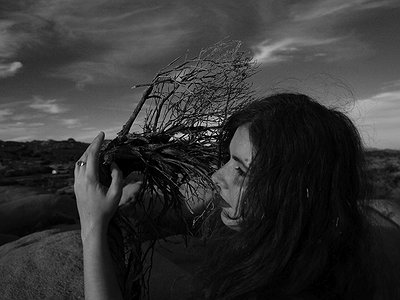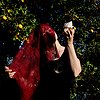Part 2
Could you describe your creative process on the basis of a piece or album that's particularly dear to you, please? Where did the ideas come from, how were they transformed in your mind, what did you start with and how do you refine these beginnings into the finished work of art?
I have just released this conceptual album that I called ALKHEMY. It is truly dear to me, I feel like I just gave birth to a child.
It is part of an ongoing work that is focused on what I call the ecology of emotions. This was first incubated during an artist residency in the eastern fjords of Iceland. The main inspiration for it is a book by Stephen Harrod Buhner called “The secret teachings of plants: the intelligence of the heart in the direct perception of nature”. This book describes how the heart organ is an oscillator that emits electro-magnetic frequencies capable of receiving and sending information with the environment that surrounds us and this connects us to the greater field on the planet.
As a whole this was also inspired by my personal relationships and my spiritual connection with nature.
Originally I was actually working on another idea for an album that I am still developing. When the idea of “the ecology of emotions” started to emerge I realised that this work was becoming a whole field of research and all the information I was collecting was too big to share in the album format. So as things evolved, Alkhemy started appearing as a focused piece expressing the deep connection of the heart organ and planet Earth.
When I was in Iceland I was spending a lot of time in the wilderness, feeling its energy and reading Buhner's book. I was collecting sounds from nature that I later started crafting into atmospheric soundscapes to use in my live show. After I returned from Iceland I found an amazing studio space on a tiny island on the outskirts of Berlin, very close to the local nature and the Havel river. That's when the music started to craft itself, most of the music was created during live improvisations that I did while rehearsing or while I was touring or travelling in Europe. So the main idea for this came from my own experience, playing a lot of underground shows and developing a language with the audience through the heart-field, my personal intimate relationships and my expanding consciousness of the environment and its role in our mental health and well being.
I am not sure if I am able to describe the exact process of how the music came to be as it is, the main thing that I feel is that I was holding space for it to manifest if that makes sense. In a similar way that I record my “audiographs” ambient series. They are improvised ambient pieces that I record in various places, something like audio photographs that give an impression of a place in a certain moment in time. The tracks on Alkhemy are very much connected to that process, the difference is that I then added personal poetry related to the concept and other sound design and beat making.
The process of refining that stage of the process into the finished work of art is quite an adventure. This is a time for me to reach out to other artists and get an external perspective. It is so much work to sing, produce and perform that I like to merge with someone else for the mixing and mastering stages which bring the work to completion. I felt very lucky to work with my friend Pablo Denegri for the mixing process. His emotional intelligence and sensitive approach to sound was truly precious. At that point the album takes on a bigger dimension, it becomes a collective work and that adds to its universal quality.
There are many descriptions of the ideal state of mind for being creative. What is it like for you? What supports this ideal state of mind and what are distractions? Are there strategies to enter into this state more easily?
I do have a little ritual process. I like to create a sacred space. Smells are quite important for me, like Tibetan incense or herbal oils, they put me straight into a creative mind set and alignment with myself. Because I've been travelling a lot I've learned to create that space anywhere that I find myself. But it is easier when I have a regular dedicated space like my studio where I can arrange the space and build a creative energy through hanging out in the space for a while.
I like to have naps where I create I find that it helps me find a different state of being where I let my natural energy flow take the lead. I enjoy not having Internet in my studio, that allows more focus in the present and into music. I have a few books that I like to read quotes from to put me in that flow. Pam Grout's “Art & Soul: reloaded” is one of them.
How is playing live and writing music in the studio connected? What do you achieve and draw from each experience personally? How do you see the relationship between improvisation and composition in this regard?
They fuel each other very much. Playing live and feeling people's presence and the atmosphere of the space I am in influence the sounds I make, on the opposite when I am writing music I sometimes think about how I will be able to reproduce this live, so sometimes this influences that process quite a lot. A track can be morphed totally from that perspective.
Live performance is one of my favourite things about my profession, it demands a lot of focus and concentration as well as a real fluidity and openness to the unknown so that it feels authentic and in tune with the audience members. I learn a lot from that, all the time, I think this will never stop, every meeting of an audience teaches or brings you something. Writing music is an introvert process, which I also love but in a way it is less challenging because it is safer, I like to expand the boundaries of my comfort zone and actually I would like to apply that to writing.
I think improvising is about letting out an energy through sounds and that can be the premiss to composition. In a way composing is a more thought after process when we put things together upon ideas and material that is already set.
How do you see the relationship between the 'sound' aspects of music and the 'composition' aspects? How do you work with sound and timbre to meet certain production ideas and in which way can certain sounds already take on compositional qualities?
I guess sound is the primal material, the clay in a way and composition in the process of building the sculpture. Sound is frequency and frequencies govern our environment, they have an impact on our perceptions and the way we apprehend what we hear. Composition is a process of putting this perception into an expression of its feeling.
I love to explore the sound quality of field recordings, researching the natural rhythm patterns and textures to enhance or structure them. I've learned to not think too much about that process but feel it more, it is a non-linear mechanism for me, a dialogue I am having with the sounds and the creative process.
Our sense of hearing shares intriguing connections to other senses. From your experience, what are some of the most inspiring overlaps between different senses - and what do they tell us about the way our senses work? What happens to sound at its outermost borders?
I really love this question, because it truly relates to the essence of my musical approach. I think hearing and feeling are deeply intertwined because as I mentioned before sound is frequency and frequencies have an impact on the way we feel. It is all connected, all of our capacities, influence each other I guess. Sound can affect the way you cook your food or start your day, everything becomes translated through our perceptions.
Art can be a purpose in its own right, but it can also directly feed back into everyday life, take on a social and political role and lead to more engagement. Can you describe your approach to art and being an artist?
I like to relate to the word “artivism” that a friend of mine Priyadarshini Ohol, a very talented female painter and performance artist from India uses. Art is a middle ground where science and the spiritual word can be explored together. It has this capacity of being able to express deep or challenging topics in various ways that can be communicated through other mediums than just spoken language. And that ability can be truly powerful for someone, this can change people's life in a deep way.
I feel that music and art in general are holding space for the individual to explore and expand their own boundaries and find healing in it. There is something really powerful in embodying your art and philosophy, it radiates onto others and that influences their will to embody that as well.
When we feel powerless this is one of the ways we can be pro-active in acting for a change. It has a true impact. I love the poetry in art and the combination of different concepts that can be transmitted through it.
It is remarkable, in a way, that we have arrived in the 21st century with the basic concept of music still intact. Do you have a vision of music, an idea of what music could be beyond its current form?
I always like to refer to the original meaning of Music, the ethymology comes from “muse”. The muses in ancient Greece were those different female spirits supposed to give inspiration to humans through the psyche. In a way music is a translation of their language. If we were able to apprehend different densities of reality other than our 3D perspective music could maybe be something that wouldn't just be experienced or produced from sounds but also from other sensory capacities.
It is probably too abstract to be developed but is an interesting idea to reflect on. We are so used to apprehend our world through a 3 dimensional perception that the idea of being able to experience something that is out of this frame of mind is probably beyond our human ability to understand.






